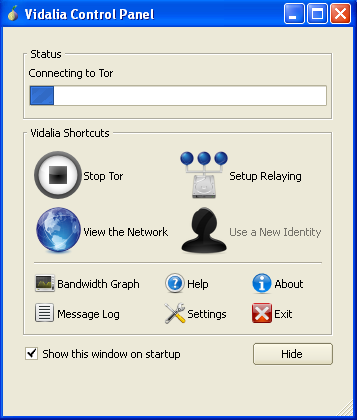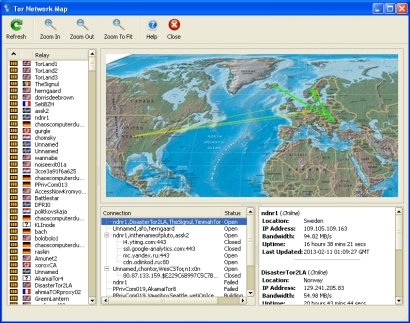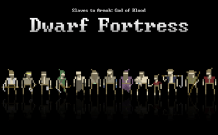 Deepnet: Perfect Privacy and Criminals
Deepnet: Perfect Privacy and Criminals
How to keep your privacy intact on the Web? How can you rest assured no-one is eavesdropping on your confidential chat or collecting data about you, right up to your preferred panties design? Here's how you can pull it off with just one piece of software and a bit of patience.
Deepnet
What? Never heard about it? No wonder. If you did, the Deepnet wouldn't be all that 'deep' and hidden from the public view. It is not a single entity, and neither is it some kind of a secret society. It is innately anarchic, decentralized, and rhizome-like, just like any other part of the Web. So, what is Deepnet?
In fact, Deepnet (aka 'Darknet') is a pretty large chunk of the Web that is not available for browsing unless you are using so-called anonymity networks. These are special network systems aimed at masking your identity on the Internet, making it as hard to track you down on the Web as possible. To enforce complying with this prerequisite, the Deepnet sites use various pseudo-domains like .onion or .bitnet, which your browser can reach only after it is modified with internal decoding routines of the respective networks. Put plainly: unless you haven't installed some specific software, the Darknet site names will be all Greek for your browser.
Logically enough, the self-imposed anonymity leads to Deepnet websites seething with hackers, weirdos and outright criminals. The almost complete anonymity gives them all the opportunity to run their illegal businesses or pursue their not-so-respectable hobbies without much fear of criminal persecution. This makes Darknet the least law-concerned area on the Web, with black marketing and other illegal activities thriving in there.
However, buying counterfeit bank cards and downloading adult movies is not the only use of Darknet. The Internet's gray zone consists not only of perverts and outlaws: it gives you a real chance to keep your privacy intact.
 Tor: Ultimate Privacy on the Internet
Tor: Ultimate Privacy on the Internet
Tor
So how do you keep your polka dot panties a private matter? Among many options, there is one that is relatively easy and rewarding: The Onion Routing, or Tor. Scientifically speaking, it is a low-latency anonimity network, a virtual counterpart of the hip Guy Fawkes Mask. As long as you're connected to Tor, your data are passed over a route of randomly selected servers. Each of the servers is privately owned and maintained by Tor enthusiasts, but don't worry, the data get encrypted before sending. The encryption requires using as many security keys as there are servers in the route. This way it is ensured that no server in the middle of the chain can intercept and read the data, as each of them only has access to one key. The resulting data transfer process looks much like peeling an onion, with one encryption layer peeled off by each server – and it was this exact apt onion methaphor which gave Tor its name.
To access the network you only need to download the free Tor software onto your computer and, optionally, spice it up with a couple of other programs. The latter include Vidalia (a UI for Tor) and Privoxy (a web proxy, i.e. an intermediary computer or filtering device between your and the websites you browse) and Tor browser (a heavily modified Firefox optimized for privacy protection). All you need to do is unpack the Tor package, launch Vidalia and press the Connect button.
 Tor: Browsing the Web through Sweden, Norway, Romania, and Iceland
Tor: Browsing the Web through Sweden, Norway, Romania, and Iceland
Anyway, there is a small problem with Tor. Of course, it's cool that it can rule out virtually any tracking by larger websites like Google or Facebook, but you just can't help noticing that browsing the Web with it is incredibly slow. Honestly, it is unbearably slow: it takes about one minute on average to open an unsophisticated webpage under Tor. Loading more feature-rich webpages there can become a very tedious task with little chance of success, which renders Tor rather inefficient for most of your daily browsing needs like watching YouTube videos or going on another Facebook frenzy. On the other hand, maybe it's not that bad?
Picture Credit: André Bochow



Yet i have all the ad, flash and script protection you can have in my browser, I even pay for a VPN that I use off and on depending what I am looking at, I shut my Facebook down since the news of them selling info to USA came out.
WHY? Because I truly believe that one day all the info put on the net today is gonna come back and bite a lot of them right back in a decade or two. Some less and some more, and I will enjoy to sit back and watch the show.
Just yesterday I was sitting on the couch in a college neeghborhood coffee house and a man I've chatted with previously was looking at his Facebook account and expressed amazement that someone had obtained access to his account immmediately after he had made a post that was critical of the large reward and huge manhunt for Christopher Dorner. I handed him Dorner's 11-page unredacted "manifesto" and told him to keep it because I had the PDF file at home. He was eager to read it because his comment about Dorner seemed to harmless to him that he could not imagine that it would merit his account being flaggged and (very sloppily) being monitored by persons unknown.
I would never put anything on a Facebook page. If I wanted to communicate with others of like mind on the internet I'd use a privacy tool to make anonymous and untraceable posts on USENET.
Humans have much in common with other animals that live in herds or tribal family structures such as dogs and monkeys. There seems to be a fundamental "urge to conform" which can be explained by evolutionary psychology as providing survival (and reproductive!) advantages to those which conform to social and behavioral norms. Conformity is an inherent part of our basic neurological wiring, with "banishment" long being the punishment meted out to nonconformists. This seems self-evident. However, human society would be a very dark and dismal place were it not for individuals who deviate from those norms and create great works of art, science, and technology. Every once in a while, there is someone like a Steve Jobs who manages to accomplish things that cause great changes in human behavior, but for every Steve Jobs, there are millions of others not so fortunate, many of whom end up rejected by the herd, often turning to self-medication and/or psychiatric poisoning, with an eventual sad end to an unhappy life.
I happen to know several people who worked at Apple in Cupertino and everyone there was terrified of Steve Jobs, who was known to fire people at the drop of a hat. While it may never be known if Christopher Dorner died by his own hand, or by police gunshott, or fire, I'd rather go the way of Dorner than have the end (and entire life) of Steve Jobs.
So it was an awesome and life-affirming event yesterday to meet a person who was supportive of Christopher Dorner's challenge to the authority of the totally corrupt social system in which we live.
It is a known fact that people behave differently when they are being watched. Human beings tend to conform to group behavior under scrutiny of their peers. Observation in this way leads subjects to display less individual behavior for fear of being stigmatized forever. This herd-like behavior is advantageous for marketing. If people are always being watched that facet of their personality never has a chance to surface. In a way, the intensive level of tracking that is become popular for businesses kills the most precious part in of all of us; the part that makes us unique.
You may use your smartphone for turn by turn directions somewhere one day or idly blaze a haphazard path through some interesting websites. Chances are you won't remember everything about either of those behaviors a day or week later. Dates, times, locations, keywords, some things may stick but chances are not much will. We may not have eidetic memories. We probably won't remember. But Google will.
Maybe it's a slight over generalization, but I find it humorous to think that tracking and sharing the private activities of a corporation is criminal, but doing the same to private citizens is profitable and just par for the course.
I could go on, but I've got stuff to do. Sorry for the wall of text.
tl:dr There is a disturbing trend of trading individuality for the convenience of one size fits all thoughts and behavior (and the cute little apps and gizmos that comes with). Without circumventing measures (of which Tor is an example) we are forced to be another cog in the machine simply to stay competitive in day-to-day life.
But I guess the general idea is that Joe Average shouldn't actually be aware that they're being watched, not unless they start wondering whether they are. And, well, this is where the fabled apathy comes in - they never wonder. There's some uncanny humour in it as well: when our Joe signs up on a forum as Mike1313 (sneaky!), and then links their Facebook account (with genuine info, no doubt) to their forum account, they sincerely believe they're being anonymous and are free to say and do whatever they like. This ignorance-fuelled exhibitionism is the worst thing about it: the trickle of personal habits turns into a deluge of low-brow wants - and the companies pick up on them. And the reason we don't get anything good out of their collecting all this individual unfiltered data is probably that those wants are not actually all that individual.
I'd argue that our Average Joe should in fact start working on how they behave (and what they do in general) when they're *not* being watched first. Then maybe they'll start worrying if they are.